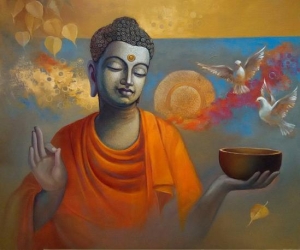6 Higher Knowledges (Abhijñā)
Abhijñā (Higher Knowledges)
Abhijñā (Pāli, abhiññā; higher knowledge) refers to a stereotyped set of typically 6 spiritual powers ascribed to Buddhas and their chief disciples:
The first 5 are mundane and attainable through the perfection of concentration (samādhi) in meditative trance (dhyāna; Pāli, jhāna):
As earthly attainments, they are deemed available to non-Buddhist sages.
In contrast, the 6th higher knowledge is supra-mundane and exclusively Buddhist, and attainable only through insight (vipaśyanā; Pāli, vipassanā) into the Buddhist truths.
The 5 mundane abhijñās include:
1) The Divine Eye (divya-cakṣus; Pāli, dibba-cakkhu), or
the ability to see the demise and rebirth of beings according to their good and evil deeds;
2) The Divine Ear (divya-śrotra; Pāli, dibba-sota),
the ability to hear heavenly and earthly sounds far and near;
3) Knowledge of Other Minds (cetaḥ-paryāya-jñāna; Pāli, ceto-pariya-ñāṇa),
the ability to know the thoughts and mental states of others;
4) Recollection of previous habitations (pubbe-nivāsanussati),
the ability to remember one’s former existences from one to thousands of rebirths, through the evolution and destruction of many world systems;
5) Various Supernatural Powers (ṛddhi; Pāli, iddhi),
such as the ability to create mind-made bodies, project replicas of oneself, become invisible, pass through solid objects, move through the earth, walk on water, fly through the air, touch the sun and moon, and ascend to the highest heaven.
In the Mahā-Parinirvāṇa Sūtra (Pāli, Mahā-Pari-Nibbāna-sutta; Great Discourse on the Parinirvāṇa), the Buddha tells his disciple Ānanda
that one who perfects the 4 bases of supernatural power (ṛddhi-pāda; Pāli, iddhi-pāda) can live for an entire eon, or for the remaining portion of an eon should he so desire.
The 6th and only supra-mundane abhijñā is the most important:
Called “knowledge of the extinction of the passions” (āśravakṣaya; Pāli, āsavakkhaya), it is equivalent to Arhatship:
The passions extinguished through this knowledge are:
1. Sensuality (kāma),
2. Becoming (bhava),
3. Ignorance (avidyā; Pāli, avijjā), and
4. Views (dṛṣṭi; Pāli, diṭṭhi).
Historically, the 6 abhijñās can be seen as an elaboration of an earlier Buddhist paradigm of human perfection called the “three knowledges” (traividya; Pāli, tevijjā):
Comprised of
1) - the recollection of former habitations,
2) - the divine eye, and
3) - knowledge of the extinction of the passions,
- the 3 knowledges form the content of the Buddha’s awakening in early canonical depictions of his enlightenment experience.
Although mastery of the 6 abhijñās is an attribute of all perfect Buddhas, the early Buddhist tradition was ambivalent toward the display of supernatural powers by members of the monastic order:
In the Kevaddha-sutta (Discourse to Kevaddha), the Buddha disparages as vulgar those monks who would reveal such powers to the laity, and in the Vinaya or monastic code, he makes it an offense for them to do so.
Despite these strictures, wonder-working saints were lionized in the literatures of all Buddhist schools, and they became the focus of numerous Arhat cults, such as those devoted to the worship of the disciples Upagupta and Mahākāśyapa.
The Mahāyāna tradition elaborated upon the abhijñās and ṛddhi of early Buddhism in its depictions of the attainments of celestial Bodhisattvas and cosmic Buddhas.
In Buddhist tantra, these same powers became the model for a host of magical abilities called siddhis possessed by tantric masters and displayed as signs of their spiritual perfection.
